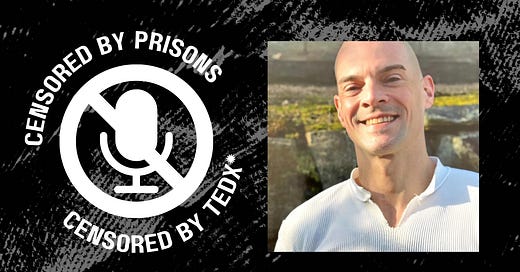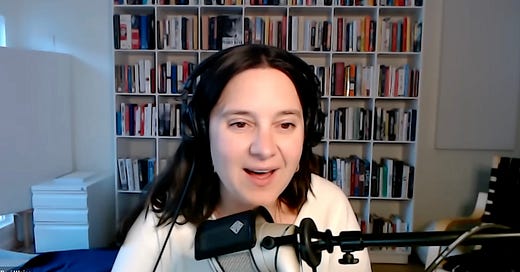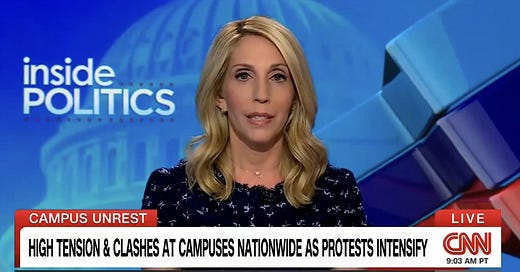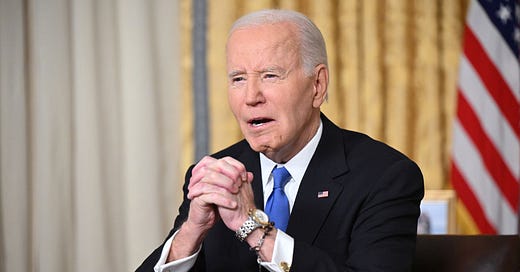
Censored By Prisons, Censored By TedX
An interview with incarcerated journalist Lyle C. May about a very special event tonight.
Let me introduce my colleague Lyle C. May. He’s an incarcerated journalist on death row in North Carolina. His bylines have graced law journals and the webpages of outlets such as Scalawag, Prism, and Slate, and he’s the author of two books (more on that in our conversation below).
I met Lyle last year through a journalism cohort program organized by Interrupting Criminalization, the prison and police abolition resource group organized by Mariame Kaba and Andrea J. Ritchie. The program paired writers on the inside and outside, hoping to see what could be created from these partnerships.
Though I wasn’t initially paired with Lyle, I’m fortunate to have gotten to work with him over the past year, which brings me to my BIG REVEAL…
I’m sharing our conversation with you today because from that cohort we did create something, which Lyle actually pitched himself. Later today, Lyle, along with fellow incarcerated writers Kwaneta Harris in Texas and Rayne Vylette in Florida, will be speaking at an online event we’ve organized together on censorship, authoritarianism, and the carceral system.
Our event, “Censored by Prisons, Censored by TedX*,” is TONIGHT, Tuesday, December 3 at 8 p.m. EST. Though we wanted to host a TedX event, we were rejected on the grounds that the “carceral state” is not a fixed location. But the radical nonprofit Chicago press Haymarket Books graciously offered to support and host our speakers. The event is also co-sponsored by the Muslim Counterpublics Lab and Empowerment Avenue. And don’t worry about setting a reminder: If you register at the link below, you’ll be emailed a link to the event when the livestream begins!
I know, I know, I’m so sorry for the late notice. I’d still be so honored it if you could make it! And if you can’t, that’s totally OK, because you can still register for the event online and be emailed a link to the recording when the event is over. Without further ado, please enjoy my conversation with Lyle (who, again, will be speaking at tonight’s event).
Can you tell me more about your background as a journalist?
The term “journalist” wasn't something I started using until the last six years or so, when people would call me a journalist, and I realized, “Oh, I guess that is what I do.” I’d been writing about prisons, penal policy, and the criminal legal system, but incarcerated journalism is very different from, “I went to journalism school, so I’m a journalist.”
With incarcerated journalism it's more an issue of survival, an opportunity to push back against that narrative used against you and your peers. There's no buffer between the topics you cover and your life in prison or connected to the criminal legal system. [With] journalism on the outside, there's often a buffer zone.
When I started writing for Scalawag magazine, I had a conversation with my friend and editor Danielle Purifoy: “I want to be that person you go to for information about the inside.” That's what I wanted to write because I was seeing zero coverage in mainstream media outlets. Or, coverage about prisons in the criminal legal system always from the perspective of the crime first, and the person second.
Compared to media coverage that gives a more “sanitized” perspective of the legal system, what topics do you find yourself covering?
I'd like to push back against that word “sanitized” because it implies something that's academic, and what's written about prisons and the criminal legal system is anything but academic. It's often threaded with tough-on-crime propaganda. If you lead a story with a crime that somebody has been convicted and sentenced for, and then talk about the conditions that they experienced as a result of their choices or lack thereof, you're automatically setting up the fallacy that justifies the mistreatment of that individual.
For example, with COVID, the reporting was like, “Do we really need to worry about people in prison?” By the time that they did, there were mass outbreaks in virtually every penal system in the U.S. and a lot of people were dying. But then the narrative became, “We need to address COVID because people that work in the prisons are just going to bring COVID back into the community.” It was never an issue of, “We need to address this because it's a humane thing to do.” It was, “COVID in prisons will further endanger the public.”
You could go much further back when you're talking about tough-on-crime policies: the [1994] crime bill and how that was sold to the public under the myth of the “superpredator.” And [Robert] Martinson's essay and then John J. DiIulio Jr.’s writings and how a lot of that was taken out of context. It was very far from sanitized. It was outright propaganda in an effort to sell this massive bill that ultimately supercharged mass incarceration.
So living in this environment and growing up in prison, you can’t help but see the actual public policy impact on the human beings that it confines. You want to say, “That's not how it goes.” And that's the meat of incarcerated journalism, and what drives much of my writing, if not all.
I appreciate you pushing back on that. It reminds me of our conversation about the ethics of covering someone you know, and this hesitancy that stems from this idea that if you're close to the topic, you're somehow incorrectly biased, even though all reporting choices are biased.
One of the good things that came out of 2020 was a greater recognition of implicit bias in policing, and teaching that you can become more aware of that bias and check yourself before you act on it. For journalists, I think it's important to recognize that implicit bias plays a part, too.
I have to be aware of it myself when I talk about the need to reduce sentences and implement a parole board. Often I’ll be asked, “But what about so-and-so and such-and-such crimes?” It’s a moment where you have to stop and say, you're absolutely right, there are going to be circumstances where you feel that a certain individual for a certain crime should not get out. But at the end of the day it shouldn't be up to an individual and certainly not an emotional decision.
Do you find that those questions are rooted in wanting to understand prison and police abolition, or do they have different intentions?
Since 2018, I've spoken at over 110 events. A lot of the time these questions come from how people genuinely think about the criminal justice system. We're so accustomed to hearing that the most extreme crimes dictate public policy for public safety.
In reality, those most extreme crimes are the smallest percentage, and we're making policy decisions through a pinhole when we should be looking at it in the other direction. That's where you come into the whole idea of sentencing commissions and parole commissions making those kinds of decisions related to that.
I just show people that we're looking at the same picture, it's just upside down. So I flip it around for them so they can see it from the perspective that maybe they hadn't been considering before.
What has your experience with censorship been like as a writer and speaker on the inside?
My first experience with censorship was back in 1994, which was when I was first incarcerated as a juvenile. I was 16 and sent to the main youth center. When you write a letter to send out, you're only allowed to seal it up after a staff member has reviewed it. They're looking for very basic things like graphic drawings or swear words. If after a brief scan, a staff member saw something that you shouldn't have written, they gave it back and said you can't send it out.
When I came to prison in 1999 after I was sentenced to death, censorship manifested in very different forms. It was in the kinds of books and magazines that we could receive via mail. Over time it grew, first with a ban on pornography, and then to the types of pictures family could send you.
It increased again when the digital revolution happened in American prisons. During COVID, you saw an even greater form of censorship in the way that your mail was digitized and scanned, and further prevented from either being received or going out, often without explanation. It’s grown to the degree that even with access to tablet messaging on the GTL GettingOut app, if I need to type certain letters, if I use the little symbols to refer to a jalapeño, if I use certain words like “white” or “black” or “patriot,” then it's going to censor my message and prevent it from going out.
I would think that “patriot” wouldn't actually trip the censor, but that is my bias from the outside, of how right-wing people have no issue expressing their “patriotism” out here.
That's where we get into the whole discussion about Project 2025. The way the prison looks at the word patriot, it's in reference to affiliation with an organization specific to domestic terrorism, to gangs inside prison, white gangs in particular. And while prison officials are very alert when it comes to gangs and gang activity, the outside is inundated with a lot of mis- and disinformation, and they often overlook things like that.
From our perspective, we recognize that “America First” has connections to Reconstruction — that a certain language being used by Republicans, conservatives, the GOP, Christian nationalists, and the alt-right all relate to each other. In looking at Project 2025, in the section on criminal justice they refer to preventing the Department of Justice from addressing forms of what they call “attacks on free speech,” when you have noted extremist groups or organizations using these kinds of language to indoctrinate and radicalize people on the right and white people in particular.
Prison officials recognize that these terms draw extremists. They recognize that these are not just simply dog whistles, but bullhorns. And of course they call the people who already manifest those biases and are looking for outlets.
Obviously I don’t want people to join white supremacist organizations, but then for that to also be part of this larger censorship machine, how do you square those two things happening?
One of the things that really stuck out to me while reading the criminal justice section of Project 2025 was one paragraph that almost makes sense. And I recognize, as a critical thinker, that this is the actual danger. It isn’t the crazy stuff that sticks out — it's the one little tidbit that maybe makes sense, and makes you think that seems reasonable. When you feed your dog a pill, you stick it in a spoonful of peanut butter. And that paragraph is essentially the peanut butter that helps the poison go down.
How has censorship impacted your work?
I was offered an opportunity to speak at Duke University School of Law to discuss a law review article I had published. The current warden didn't like the idea of people on death row calling up to any public forums and said, “You have to go through me.” We filed a formal application, but just days before the event, I was told I wasn’t going to be allowed to speak. Ultimately, that alerted a professor at Duke who basically told the student organizing the talk that even if they did record and play the speech, they felt like it would violate the wishes of the warden.
I've been threatened by staff. I've been told that I need to get my facts right because it doesn't align with what they believe happens. You'll often hear the communications office for the North Carolina Department of Adult Correction say, “That's not anything on our record, so it can't exist,” or, “That's not anything that we condone, so it must be illicit or illegal.”
That's the scariest part of what authoritarian environments do, and of Project 2025. If you think that prisons are the starting point for censorship, you're wrong. It's the starting point for an authoritarian environment, and when that environment reaches beyond walls to get into your public schools and your communities and your local, state and federal governments, it's not an issue of censorship or immigration or gender identity or DEI: it's an issue of authoritarian rule of control and constraint where you thought you had freedom and liberty.
In one of our conversations this week, you talked about how prisons normalize inhumane treatment of people. How does censorship relate to normalization, and what might people on the outside not understand about this relationship?
It's important to understand that by normalizing a behavior, you start to ignore it, and when you ignore the behavior, it spreads. Yes, prisons are designed to constrain, isolate, and punish behavior. But when you say you can't access certain content, and then you say prison is the controlled environment granted through the 1987 Turner v. Safley Supreme Court ruling — that ultimately said control can be justified through both a penological interest and a government interest — the twist of that word “penological” versus “government” bridges the gap between what occurs in prisons, and what is occurring in the public.
Then take the leap from censored materials in prison, hingeing on that particular Supreme Court ruling, to the idea of book bans and libraries, particularly for K-12 schools. You justify that censorship by saying, “Children shouldn't have access to these materials,” and it's a false flag. Children aren’t being handed these books like, “Here, read this. You should believe this.” It's not that at all. It's that the information is accessible. You can't ban certain information with the actual belief that information will no longer exist.
The censorship in prison is ultimately about narratives, with mainstream media portraying the image of people in prison and crime and punishment. A similar circumstance happens with the criminalization of immigrants and the LGBTQ community. It was always about dehumanizing, demonizing, and criminalizing a class of people to make the more inhumane aspects of treatment easier to swallow.
That particular tactic functions through censorship of accurate information, because in its absence misinformation slips in and disinformation is applied. And that's how you use wedge issues such as immigration, gender identity, DEI programs, and say, “We're not bad guys for trying to eliminate people. We’re the good guys for saying your morality has disappeared and we're here to reassert it.” That's one of the things I'll be talking about in my presentation for “Censored by Prisons, Censored by TEDx”: where does this idea of morality come from specific to conservatives, evangelicals, white nationalists, and Christian nationalists?
What insight or advice would you want to share with people wanting to better understand prisons and support incarcerated people?
I'm gonna go to the roots of what journalism is, and that is simply critical thinking and skepticism. You have to be a critical thinker to absorb all of the information and rhetoric out there and come out with a better understanding — not necessarily a partisan understanding, but one with a holistic view of the topic, and that includes prisons, the criminal legal system, the judiciary, and everything related therein.
With prisons, we can talk about that until we're blue in the face. We can talk about authoritarianism and all of the fears that are attached to it, but unless people actually understand what those words mean and what’s involved, it won't be helpful. So, approach information about the criminal legal system and prisons with a question mark between you and that information. Look for other sources related to it, spot the differences, and follow the sources.
Source credibility absolutely matters. Obviously, I expect people to question my own credibility as somebody in prison who has a vested interest. I will tell you, as an incarcerated journalist, I have an agenda. That's very obvious. But if you go in understanding that, then you begin to really see what it is that I'm talking or writing about. We're humanizing ourselves and our experiences. We're showing you that it's not just specific to prisons. It's specific to your communities.
When you gain that awareness and ability to recognize those things, you can better address them in your own community. It's going to be your elected leaders, at the local level, the state and the federal level. Address your elected leaders. Not by calling them out on social media, which seems empty and vacuous. You address it by voting, and by going after the people that fund them. You get them where they trade their morality for their pocketbook.
Where can people learn more about these topics and your work?
You can always check out my book Witness: An Insider's Narrative of the Carceral State, which Haymarket Books published earlier this year. I discuss a lot of these things: censorship, the death penalty and life in prison and incarcerated journalism, and voting and election politics. It's a good primer for people who are unfamiliar or don't know all the nuances of the criminal legal system and the carceral state.
The other half of what I do is education, so I would recommend my second book, The Transformative Journey of Higher Education in Prison: A Class of One, published by Routledge academic press. It’s about the importance of access to higher education for everyone in and out of prison. You can also subscribe to my newsletter from my website, which I send out when I have updates.
This blog is part of our interview series, Discourses. To read all of our interviews, click here.



















This is such a great interview!
These Q&As should be posted as podcasts